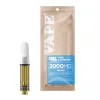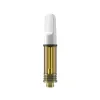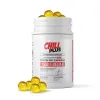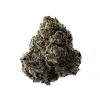Cannabis and its derivatives have been used for medicinal purposes for centuries, and with the recent legalization of hemp and hemp-derived cannabinoids in the United States, more research has been conducted on the plant's compounds.
You’ve likely already heard about delta 9—the main and most prominent psychoactive compound in cannabis plants—as well as delta 8, which has virtually the same effects as delta 9 but with half the psychoactive potency. But many new hemp compounds have emerged in the past few years, and one that follows delta 8 closely in popularity is delta 10.
Both, delta 10 and delta 8 have gained popularity for their potential therapeutic benefits, especially in treating insomnia, anxiety, nausea, and depression. But what exactly is delta 10? And how do its potential benefits and side effects compare to those of delta 8? Let’s explore both compounds, as well as their similarities and differences.
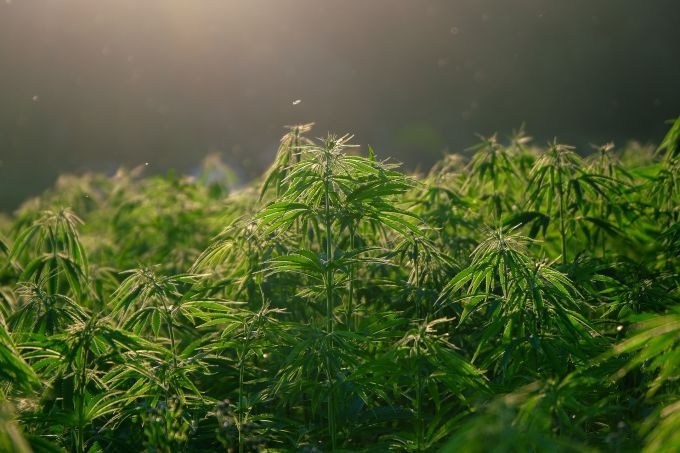
What is Delta 10?
Delta 10, short for delta-10-tetrahydrocannabinol, is a relatively new cannabinoid, and research on its potential benefits and risks is still in the early stages. However, some initial studies suggest that it may have potential therapeutic benefits, especially in treating anxiety and depression. Delta 10's unique chemical structure is thought to be responsible for its potential therapeutic effects.
Delta 10's chemical structure is similar to delta 9 THC, the primary psychoactive cannabinoid found in cannabis. That said, the two compounds differ chemically on their double bond placement. While delta 9 has a double bond in its ninth carbon atom, delta 10 contains a double bond on its tenth. This difference in double bond position on the carbon chain gives delta 10 unique properties that distinguish it from delta 9 and delta 8. This difference in chemical structure also affects how delta 10 interacts with the body's endocannabinoid system, which regulates various physiological processes such as mood, appetite, and sleep.
Unlike delta 9 THC, delta 10 does not naturally occur in large amounts in the hemp plant. Instead, it is typically derived from CBD, which is bountiful in hemp plants, in lab environments using advanced CO2 extractions.
While delta 10's potential benefits and risks are still being studied, some users have reported feeling more focused and energized after consuming delta 10. Some also report that it has a milder psychoactive effect than delta 9 THC, making it a potential alternative for people who want the benefits of cannabis without the intense high.
All in all, although delta 10 has not been studied to the same extent of some of its siblings, the compound is known by users to give them energy, focus, and help with creativity. Delta 8, on the other hand, is more about relaxation. In other words, delta 10 has sativa-like effects, while delta 8 exhibits more indica-like properties.
While delta 8 is around half as potent as delta 9, delta 10 is less potent than delta 8. This makes delta 10 a wonderful choice for those wishing to feel muted and manageable psychoactive effects. If what you’re looking for is the effects of delta 9 with lesser intensity, however, delta 8 is a more suitable alternative.
Delta 8 vs Delta 10 – Discover the Difference
While delta 8 and delta 10 share a similar chemical structure, their differences in the location of the double bond on the carbon chain result in significant differences in their psychoactive properties. Delta 8 has a double bond on the eighth carbon atom, while delta 10, as we previously mentioned, has it on the tenth carbon atom.
Delta 8's effects are often described as mild, with a less intense high than delta 9 THC, making it a popular alternative for people who want the benefits of cannabis without feeling too intoxicated. Delta 8's psychoactive effects have been studied more extensively than delta 10, and research suggests that it may have potential therapeutic benefits, including pain relief, anti-inflammatory effects, and anti-anxiety effects.
In contrast, delta 10's psychoactive effects are still being studied, and information on its potential therapeutic benefits and risks is limited. However, some initial reports suggest that it may have more energizing effects than delta 8, with users reporting feeling more focused and alert after consuming delta 10.
While delta 8 is known for its mild and relaxing psychoactive effects, delta 10's unique chemical structure may have different effects on the body, making it a potential alternative to delta 8 for people looking for a different experience.
Research on delta 10 and delta 8 is still in its early stages, and there is limited clinical research on their potential therapeutic benefits. However, some preliminary studies suggest that both cannabinoids may have potential medical applications. Here are some examples:
- Potential anti-tumor effects of delta 10: A 2020 study published in the journal Cannabis and Cannabinoid Research investigated the anti-tumor effects of delta 10 on lung cancer cells. The researchers found that delta 10 had anti-tumor effects and inhibited cancer cell growth in a dose-dependent manner.
- Potential anti-inflammatory effects of delta 8: A 2020 study published in the journal Bioorganic & Medicinal Chemistry investigated the anti-inflammatory effects of Delta 8 on mice with corneal injury. The researchers found that delta 8 reduced inflammation and pain in the mice.
- Potential anxiolytic effects of delta 8: A 2020 study published in the journal Psychopharmacology investigated the anxiolytic effects of Delta 8 on mice. The researchers found that delta 8 reduced anxiety-like behavior in the mice and may have potential as an anxiolytic agent.
While these studies show some potential therapeutic benefits of delta 10 and delta 8, more research is needed to determine their safety, efficacy, and optimal dosages. It is important to consult with a healthcare professional before using either cannabinoid, especially if you have any underlying medical conditions or are taking any other medications.
In conclusion, while Delta 8 and Delta 10 share a similar chemical structure, their differences in the location of the double bond on the carbon chain result in significant differences in their psychoactive properties. While delta 8 is known for relaxing, stress-reducing effects, delta 10 is milder and results in a more energetic high.
|
Cannabinoid |
Delta 8 |
Delta 10 |
|---|---|---|
|
Potency |
Mild |
Very Mild |
|
Effects |
|
|
|
Double Bond Placement |
8th carbon atom |
10th carbon atom |
What You Need To Know About Delta 10 and Delta 8
When it comes to new cannabinoid compounds, it’s always important to do some research on their potential benefits and positive effects, as well as any negative or unwanted side effects using a new compound may bring. While medical research on delta 10 and delta 8 is still ongoing, we do know a few things about both compounds that you should also know.
What You Need to Know About Delta 8
Although you may be new to delta 8, the compound has been known by scientists for decades. It was originally discovered in 1965 by Dr. Raphael Mechoulam, popularly known as “The Father of Cannabis.” According to a 1973 study, the compound may have the following effects on users:
- Visual distortions
- Euphoria
- Relaxation
In 2022, a study published in the Journal of Cannabis Research found that delta 8 is less prone to causing intense adverse side effects, including paranoia and anxiety. This finding was later fortified earlier in 2023, when a study surveyed delta 8 users, about half of whom used delta 8 for medical reasons including panic attacks, stress, depression, and chronic pain. Researchers concluded that delta 8 was an effective substitute for delta 9, as it had the same effects at half the psychoactive potency and with less intense side effects.
Anecdotally, delta 8 users claim that delta 8 makes them feel relaxed, free from stress, and in some cases, sleepy. Additionally, they also claim that the compound is effective at stimulating the appetite, a common effect of cannabis commonly known as “the munchies.”
Although research on delta 8 is still in its infancy, the compound seems to have a similar safety profile to its better-studied older sibling, delta 9. The only area where the two compounds differ, it seems, is that delta 8 is less potent and less likely to make users feel anxious or paranoid.

What You Need to Know About Delta 10
Research on delta 10 is even more limited than delta 8’s, but again, there are some things we know based on some studies and lots of user accounts.
In the 1980s, Dr. Mechoulam conducted a study on the effects of delta 10 compared to delta 9 on pigeons. The study found that while delta 10 may have some psychoactive effects, they’re much less potent than those of delta 9. We also know that delta 10 is even milder than delta 8, and it has more invigorating effects as well.
Anecdotal evidence suggests that delta 10 provides energy, focus, and an influx of creativity, making it a great candidate for those wishing to still experience the psychoactive effects of cannabis at a much lower potency as well as for those with busy schedules who can’t afford to slow down due to cannabis’s often couch-locking effects. Because of a lack of research, however, these claims have not yet been scientifically proven.
Dosing Delta 8 and Delta 10
When it comes to cannabinoid compounds, dosing isn't an exact science. An accurate dosage may depend on your weight, rate of metabolism, tolerance, and desired effects, meaning that a dose that works for you may not work for someone else.
When taken correctly, cannabinoids can be extremely beneficial for a plethora of reasons, whether you’re looking for an extra boost of energy or a little relaxation after a long day. That said, overindulging in cannabis compounds can also result in some adverse effects, including:
- Red eyes
- Dry mouth
- Slowed reaction times
- Anxiety
- Rapid heart rate
Dosing accurately is the most important step to take in order to avoid these unwanted side effects, so it’s extremely important that you follow product instructions and know your own tolerance threshold. If you’re planning on using delta 8 or delta 10 for specific purposes, it’s always a good idea to consult your healthcare provider and be truthful about what you’re consuming and why. If you want to give delta 8 or delta 10 a try, here’s a dosage chart based on tolerance levels:
| Compound | Dosage |
|---|---|
|
Delta 8 |
Low: 5-15mg Medium: 15-45mg High: 45-150mg+ |
|
Delta 10 |
Low: 5-15mg Medium: 15-45mg High: 45-150mg+ |
Remember, delta 8 is stronger than delta 10, so even if you were able to handle a medium delta 10 dose, you might want to stick with a low delta 8 dose for similar effects. Additionally, it’s important to keep in mind that these are mere suggestions based on tolerance. As previously mentioned, many other individual aspects affect the way in which cannabinoids will impact your body and mind.
As a rule of thumb, especially when it comes to using a new cannabinoid, it’s always best to start lower than you think you should and work your way up from there. It may sound a little tedious, but it’s much better than the alternative of taking too much and having a bad time!

The Legality of Delta 10 vs Delta 8
Delta 10, delta 8, and delta 9 are all derivatives of hemp and are federally legal in the United States under the 2018 Farm Bill. Also known as the Agriculture Improvement Act, the bill created a legal difference between hemp and marijuana based on THC concentrations. Any cannabis plant containing more than 0.3% THC is considered marijuana, while cannabis plants not surpassing that 0.3% THC threshold are considered hemp and are therefore legal at the federal level.
However, it is essential to note that some states have different laws regarding the legality of delta 8 and delta 10. For example, some states have banned Delta 8, while others have not addressed its legality. It is important to research your state's laws before purchasing and using these cannabinoids.
As of April of 2023, here’s a list of states and whether or not delta 8 and delta 10 are allowed in the state, but remember, legislation is always subject to change, so it’s best to do your own research before purchasing cannabinoids:
|
State |
Delta 8 |
Delta 10 |
|---|---|---|
|
Alabama |
Yes |
Yes |
|
Alaska |
No |
No |
|
Arizona |
No |
No |
|
Arkansas |
Yes |
No |
|
California |
Yes |
Yes |
|
Colorado |
No |
No |
|
Connecticut |
No |
Yes |
|
Delaware |
No |
No |
|
Florida |
Yes |
Yes |
|
Georgia |
Yes |
Yes |
|
Hawaii |
Yes* |
Yes |
|
Idaho |
No |
No |
|
Illinois |
Yes |
Yes |
|
Indiana |
Yes |
Yes |
|
Iowa |
No |
No |
|
Kansas |
Yes |
Yes |
|
Kentucky |
Yes |
Yes |
|
Louisiana |
Yes* |
Yes |
|
Maine |
Yes |
Yes |
|
Maryland |
Yes |
Yes |
|
Massachusetts |
Yes |
Yes |
|
Michigan |
No |
Yes |
|
Minnesota |
No |
Yes |
|
Mississippi |
Yes |
No |
|
Missouri |
Yes |
Yes |
|
Montana |
No |
No |
|
Nebraska |
Yes |
Yes |
|
Nevada |
No |
Yes |
|
New Hampshire |
Yes |
Yes |
|
New Jersey |
Yes |
Yes |
|
New Mexico |
Yes |
Yes |
|
New York |
No |
No |
|
North Carolina |
Yes |
Yes |
|
North Dakota |
No |
Yes |
|
Ohio |
Yes |
Yes |
|
Oklahoma |
Yes |
Yes |
|
Oregon |
No |
Yes |
|
Pennsylvania |
Yes |
Yes |
|
Rhode Island |
No |
No |
|
South Carolina |
Yes |
Yes |
|
South Dakota |
Yes |
Yes |
|
Tennessee |
Yes |
Yes |
|
Texas |
Yes |
Yes |
|
Utah |
No |
No |
|
Vermont |
No |
Yes |
|
Virginia |
Yes* |
Yes |
|
Washington |
Yes |
Yes |
|
West Virginia |
Yes |
Yes |
|
Wisconsin |
Yes |
Yes |
|
Wyoming |
Yes |
Yes |
*Yes: Delta 8 is legal in these states with some exceptions, such as inhalable or edible products.
Delta 8 vs. Delta 10: Final Thoughts
Delta 8 and Delta 10 have both gained a gargantuan following from cannabis enthusiasts in recent years. While more research is certainly needed on both compounds, their safety profiles seem to be similar to that of their well-studied sibling, delta 9, due to their chemical proximity to the compound.
Although both of these cannabinoids are much milder than delta 9, they have their own unique set of effects and benefits that make them desirable to consumers. On one hand, delta 8 is known to have the same mellowing and relaxing effects as delta 9 to a much less potent extent. On the other hand, delta 10 is even milder than delta 8 and is known to have more energizing and invigorating properties.
So, which is better? The answer to this question depends solely on you and the effects you wish to gain. If you want a relaxing and laidback experience, delta 8 is the better option for you, but if you want to experience mild psychoactive effects while also feeling focused, energized, and alert, delta 10 is the way to go. One thing’s for certain, both of these cannabinoids can be incredibly beneficial when used correctly!

